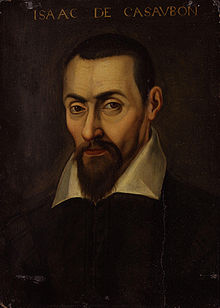Isaac Casaubon
Isaac Casaubon (born February 18, 1559 in Geneva , † July 1, 1614 in London , pseudonyms Hortibonus, Misoponerus) was a learned Protestant and important humanist .
Life
Isaac Casaubon was born in Geneva as the son of Huguenot refugees. After the Edict of Nantes was issued, the family moved back to France. He allegedly got his first Greek lessons from his father in a cave after the so-called Bartholomew Night on the run from Catholic persecutors. He then studied in Geneva and Leiden , married a daughter of the important humanist printer Henri Estienne , and in 1596 accepted an appointment at the University of Montpellier . Then he was in Lyon and until 1610 in Paris . He spent his last years in London.
Casaubon is known among philologists and historians of philosophy today primarily through his evidence in De rebus sacris et ecclesiasticis exercitationes XVI (1614, London) that the so-called Corpus Hermeticum could not have originated earlier than in the 1st century AD. For the enlightened spirits of the 17th and all later centuries, a belief that had inspired many of the great free Renaissance humanists (from Marsilio Ficino to Giordano Bruno ) had to be put aside: that it was an extra-biblical ancient wisdom from the Mosaic and pre-Mosaic There is time that could provide the basis of all true philosophy. As a substitute for this, however, the European intelligentsia soon “discovered” the extra-biblical traditions of India and China.
The name Scriptores Historiae Augustae ("author of the imperial history") , which is still used today, for the six authors of the Historia Augusta , which are now generally accepted as fictitious, goes back to Casaubon's edition of 1603 .
Works
- Notae ad Diogenis Laërtij libros de vitis, dictis et decretis principum Philosophorum , Morges, J. Le Preux, 1583. Digitized version of the BSB
- Theocriticarum lectionum libellus , in: Vetustissimorum Authorum Georgica, Bucolica & Gnomica poemata quae supersunt , (Geneva), Vignon, 1584
- Animadversionum in Athenaei dipnosophistas , Lyon, Antoine de Harsy, 1600
- Historiae Avgvstae Scriptores Sex. Aelius Spartianus, Iulius Capitolinus, Aelius Lampridius, Vulcatius Gallicanus, Trebellius Pollio, & Flauius Vopiscus. Isaacvs Casavbonvs ex vett. libris recensuit: idemque librum adiecit emendationvm ac notarvm , Paris, Drouart, 1603
- De satyrica graecorum poesi et romanorum satira libri duo , Paris, Drouart, 1605
- De rebus sacris et ecclesiasticis exercitationes XVI , Frankfurt, Bring 1615. Digital copy of the BSB
- Auli Persii Flacci Satirarum Liber. Isaacus Casaubonus Recensuit, & Commentario Libro Illustravit. Ad Virum Amplissimum D. Achillem Harlaeum Senatus Principem , Paris, Drouart, 1615
- Misoponeri Satyricon. Cum notis aliquot ad obscuriora prosae loca et Graecorum interpretatione . Leiden, Sebastianus Wolzius, 1617
reception
In Umberto Eco's novel The Foucault Pendulum , the first-person narrator is called Casaubon.
Text output
- Guerrino F. Brussich (Ed.): Isaac Casaubon: Polibio. Sellerio, Palermo 1991 (Latin text and Italian translation)
literature
- Mark Pattison : Isaac Casaubon, 1559-1614. 2nd edition, Oxford: Clarendon Press, 1892.
- Frances A. Yates : Giordano Bruno and the Hermetic Tradition. Routledge and Kegan Paul, London, 1964 (including the final chapter).
- Anthony Grafton and Joanna Weinberg, “I have always loved the Holy Tongue”: Isaac Casaubon, the Jews, and a Forgotten Chapter in Renaissance Scholarship. Cambridge / MA, London: Belknap Press of Harvard University Press, 2011. ISBN 978-0-674-04840-9
Remarks
Web links
- Works by and about Isaac Casaubon in the German Digital Library
- Publications by and about Isaac Casaubon in VD 17 .
- CAMBRIDGE MODERN HISTORY - VOLUME III - THE WARS OF RELIGION CHAPTER II. FRENCH HUMANISM AND MONTAIGNE.
| personal data | |
|---|---|
| SURNAME | Casaubon, Isaac |
| BRIEF DESCRIPTION | Philologist, Protestant, humanist |
| DATE OF BIRTH | February 18, 1559 |
| PLACE OF BIRTH | Geneva |
| DATE OF DEATH | July 1, 1614 |
| Place of death | London |
